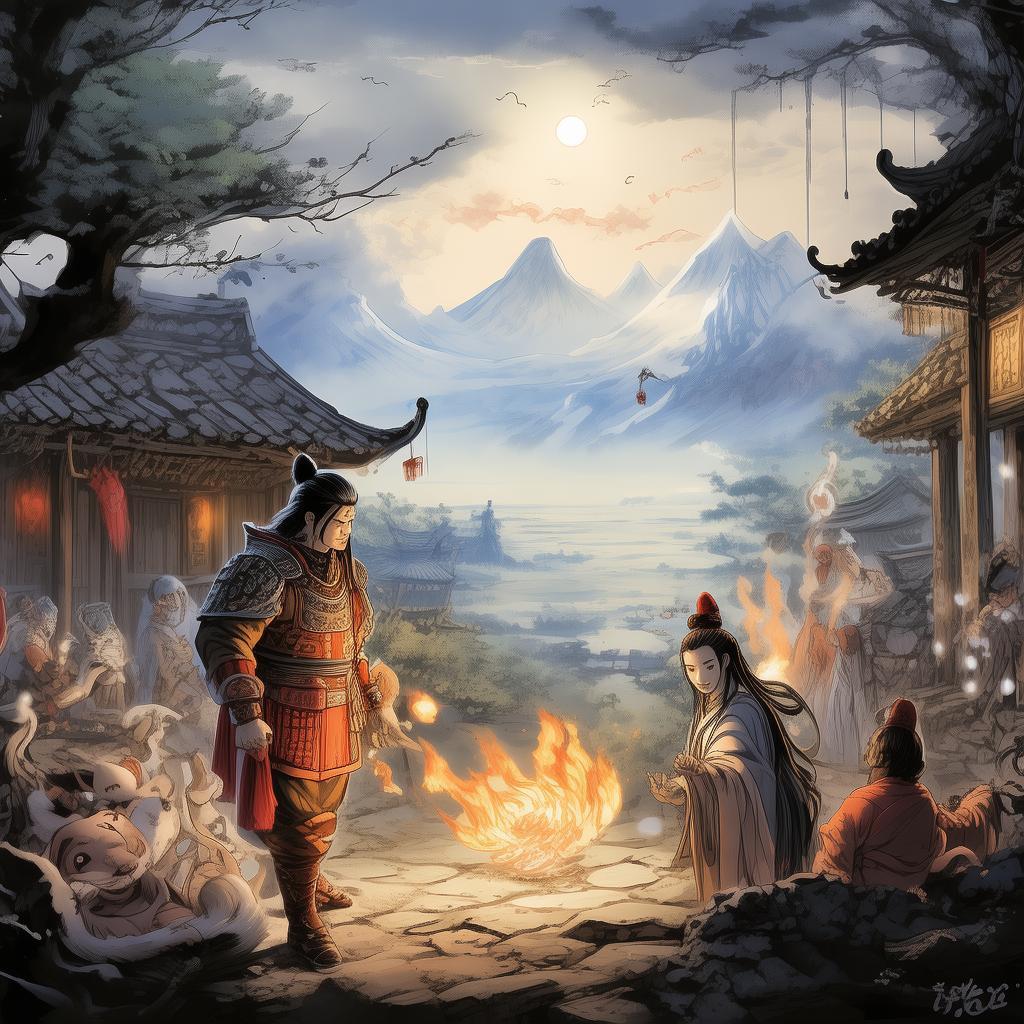The Futuristic City Where Qu Yuan Writes the Past
In the heart of the sprawling metropolis of Linghu, where towering skyscrapers kissed the clouds and neon lights painted the night sky, there was a place that stood out like a beacon of the ancient past. It was a library, not like any other, for it housed the most advanced time-traveling technology known to man. This was the place where Qu Yuan, a revered poet from the Warring States period of ancient China, had found himself.
Qu Yuan was no ordinary man. Known for his melancholic verses and his tragic suicide in the river Miluo, he was a symbol of loyalty and love for his homeland. But in this futuristic city, he had become an enigma, a man out of time, surrounded by the marvels of the 31st century.
The library, known as the Tempus Chronicles, was the brainchild of Dr. Ling, a brilliant scientist who had dedicated his life to the study of time. The Tempus Chronicles was a fusion of ancient wisdom and futuristic technology, a place where the past and the future intertwined in a seamless dance.
One rainy evening, as Qu Yuan wandered through the aisles of the library, his eyes fell upon a peculiar device, a time-writing pen. It was said that this pen had the power to alter the past, to rewrite history itself. Intrigued, Qu Yuan approached the device, his heart pounding with a mix of fear and excitement.
With a deep breath, he dipped the pen into the inkwell and wrote a few words. The pen hummed softly, and a holographic window appeared before him. It was a vision of ancient China, the Warring States period, and the river Miluo. Qu Yuan's heart raced as he saw his own reflection in the water, the image of him drowning himself in a fit of despair.
He reached out to touch the hologram, and the pen in his hand began to glow. In that moment, Qu Yuan was no longer in the futuristic city; he was in the past, standing on the banks of the river Miluo.
As he watched, a young woman approached him, her eyes filled with sorrow. She was a devoted follower, one who had heard the tales of his tragic end. Qu Yuan felt a pang of sorrow as he realized that he could change this. He could prevent his own demise.
With a trembling hand, he reached out to the hologram, and the pen began to write. The woman, seeing Qu Yuan's actions, hesitated, but then approached him, her curiosity piqued. Qu Yuan, using the ancient language of his time, spoke to her, his voice filled with urgency.
"You must not follow me," he whispered. "You must live, and you must love."

The woman nodded, her eyes brimming with tears. She turned and walked away, her life altered by the poet's intervention. Qu Yuan watched her go, his heart heavy with the weight of the responsibility he had just undertaken.
He returned to the Tempus Chronicles, the pen still in his hand. He realized that he had the power to rewrite history, but with that power came great risk. What if he changed something too fundamental? What if the world he knew and loved was no more?
Days turned into weeks as Qu Yuan continued to use the pen to alter the past. He prevented the assassination of a king, saved a young girl from a cruel fate, and even wrote a love letter that brought two hearts together. Each time, he felt the weight of his actions, the ripple effects of his pen.
But then, a twist in fate brought Qu Yuan face to face with his own past. The woman he had saved was his ancestor, and the king he had saved was his own descendant. Qu Yuan realized that his actions were not just altering history, but also his own destiny.
In a heart-wrenching moment, Qu Yuan faced the choice of whether to continue rewriting history or to let it unfold as it should. He looked at the pen in his hand, the tool that had given him power but also brought him pain.
With a heavy heart, Qu Yuan dipped the pen into the inkwell once more. This time, he wrote a simple message: "Let the past be, and let the future unfold as it will."
The pen hummed softly, and the holographic window before him began to fade. Qu Yuan was back in the Tempus Chronicles, the pen now resting in its cradle. He took a deep breath, the weight of the past lifting from his shoulders.
As he left the library, the rain continued to fall, the city around him a testament to the marvels of technology and the enduring power of love. Qu Yuan had learned that sometimes, the greatest gift one can give is the freedom to live, to love, and to let the past be just that—the past.
The Futuristic City Where Qu Yuan Writes the Past is a story of love, destiny, and the power of choice. It is a tale that transcends time, a reminder that history is not set in stone but rather a tapestry that can be woven and rewritten by the hands of those who dare to reach into the past.
✨ Original Statement ✨
All articles published on this website (including but not limited to text, images, videos, and other content) are original or authorized for reposting and are protected by relevant laws. Without the explicit written permission of this website, no individual or organization may copy, modify, repost, or use the content for commercial purposes.
If you need to quote or cooperate, please contact this site for authorization. We reserve the right to pursue legal responsibility for any unauthorized use.
Hereby declared.









